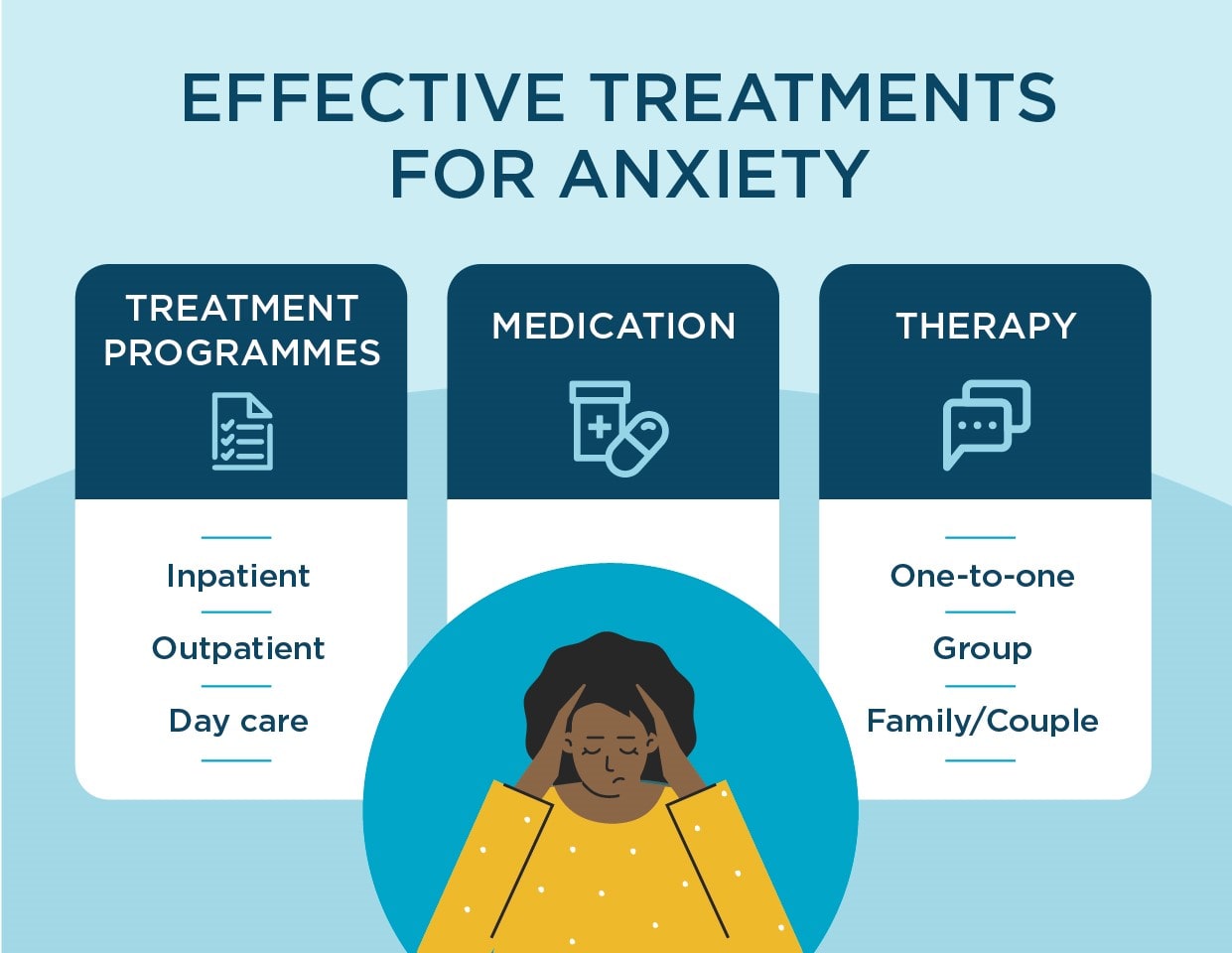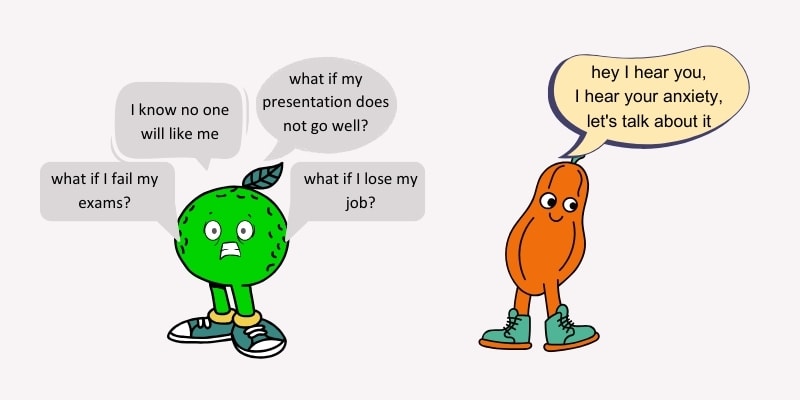Start your journey with counselling for anxiety disorder led by professionals
Start your journey with counselling for anxiety disorder led by professionals
Blog Article
Exploring Different Strategies in Therapy for Anxiousness Disorder for Enduring Adjustment
When tackling stress and anxiety disorders, it's crucial to check out a selection of therapy methods. Each approach offers distinct understandings and devices to help you manage your signs and symptoms effectively. You might find that combining methods can generate the best results. Understanding the nuances of these techniques is crucial to promoting long-term adjustment. What happens if the right combination could release a new level of emotional well-being for you?
Understanding Anxiety Conditions: A Short Introduction
Stress and anxiety conditions, which impact millions of people worldwide, can considerably influence life. You may experience frustrating feelings of worry or fret that seem uncontrollable. These feelings can bring about physical signs and symptoms like an auto racing heart, sweating, and even lightheadedness. Typical sorts of anxiousness conditions consist of generalised stress and anxiety disorder, panic attack, and social anxiety problem. Each has one-of-a-kind indicators, however they all share a propensity to disrupt your regular and relationships.Understanding the origin of your anxiousness is essential. It may come from genetics, mind chemistry, or life experiences. Identifying your triggers can assist you manage your feedbacks much better. It is very important to keep in mind that you're not the only one in this struggle. Many individuals encounter similar challenges, and looking for assistance is a solid action toward sensation better. By learning more about anxiety problems, you're already on the course to understanding and handling your problem extra successfully.
Cognitive-Behavioral Treatment: Challenging Adverse Thought Patterns

Determining Negative Idea Triggers
When you come across moments of distress, recognizing the certain triggers behind your negative ideas can be crucial in handling stress and anxiety. Start by paying interest to situations that prompt sensations of concern or fear. Is it a congested room, an approaching target date, or a conversation with particular people? Write down these circumstances in a journal. This will aid you identify patterns in your thinking. Notification physical experiences that accompany your unfavorable ideas, like a racing heart or tightness in your upper body. By pinpointing these triggers, you acquire understanding right into what's fueling your stress and anxiety. Recognizing these links is the first step in testing those ideas and ultimately gaining back control over your psychological responses.

Changing Thoughts With Positives
Testing negative thought patterns is an important step in changing your attitude and reducing stress and anxiety. You might usually find yourself caught in cycles of insecurity or catastrophic thinking. Instead of allowing these ideas dictate your feelings, method changing them with sensible choices or favorable affirmations. When you believe, "I can not manage this," shift it to, "I can take care of obstacles one step at a time." This simple adjustment can significantly affect your emotional state. Regularly identifying and countering these negative ideas aids create a healthier interior discussion. Remember, it takes time and effort, but regularly practicing this technique can lead to long-term adjustment, encouraging you to encounter stress and anxiety with renewed confidence and resilience
Structure Coping Methods With Each Other
Changing unfavorable thoughts is only the start of handling stress and anxiety efficiently. To create long-term adjustment, you need to build coping approaches that encourage you. Cognitive-Behavioral Treatment (CBT) assists you identify and test those purposeless thought patterns. With each other, you and your counselor can explore just how these thoughts influence your sensations and behaviors.Start by developing practical strategies, like journaling or mindfulness exercises, that permit you to face anxiety head-on. When you encounter your worries gradually, you'll discover to respond in different ways.

Mindfulness and Acceptance-Based Approaches: Cultivating Present-Moment Understanding
As you navigate the intricacies of anxiety, including mindfulness and acceptance-based methods can significantly enhance your capability to cultivate present-moment recognition. By focusing on the present moment, you'll find that you can observe your thoughts and sensations without judgment. This practice helps you acknowledge your stress and anxiety without really feeling overwhelmed by it.Engaging in mindfulness workouts, such as deep breathing, body scans, or directed reflections, enables you to ground yourself in your present experience. Acceptance-based techniques urge you to accept your emotions as opposed to battle against them. They shed their power over you.Incorporating these practices right into your daily regimen can change how you react to anxiety when you approve your feelings. You'll create durability and find out to navigate demanding circumstances with greater simplicity. Ultimately, growing present-moment awareness lays the foundation for enduring modification, equipping you to lead an extra satisfying life.
Direct Exposure Therapy: Facing Fears Slowly
Direct exposure therapy assists you confront your concerns in a steady way, making it much less frustrating. You'll find out methods to encounter anxiety-provoking situations action by action, while also developing coping strategies to manage your responses. This strategy empowers you to take control and decrease stress and anxiety with time.
Gradual Exposure Strategies
When encountering anxiety, slowly facing your anxieties can be a powerful means to restore control. This method, referred to as gradual exposure, includes gradually exposing yourself to the situations or items that activate your anxiousness. Start with less intimidating situations and slowly work your way approximately even more difficult ones. If you're afraid of public speaking, you might begin by speaking in front of a mirror, after that proceed to sharing ideas with a close friend, and eventually deal with a little group. Each step helps desensitize you to the fear, building your confidence over time. Remember, it's important to speed yourself and commemorate tiny triumphes as you relocate through this process, enhancing your capacity to manage anxiousness successfully.
Building Coping Techniques
Structure effective coping approaches is crucial for taking care of stress and anxiety, particularly as you confront your anxieties progressively. One powerful method is direct exposure therapy, where you begin by encountering your concerns in a controlled fashion. Begin with much less daunting circumstances and slowly function your method up to even more challenging circumstances. This steady exposure helps desensitize look here you to stress and anxiety sets off, making them much less overwhelming.Incorporate leisure techniques, such as deep breathing or mindfulness, to relax your mind throughout direct exposure. Track your progression, celebrating tiny success along the means to improve your confidence. Remember, it's all right to take your time; the goal isn't excellence however consistent enhancement. By constructing these approaches, you'll equip yourself to browse stress and anxiety and accept life a lot more fully.
Psychodynamic Treatment: Uncovering Source of Anxiety
Psychodynamic treatment discovers the unconscious mind, exposing the source of your stress and anxiety - Counseling services for anxiety. By analyzing your thoughts, sensations, and previous experiences, this approach assists you reveal underlying conflicts and unsettled problems that might add to your current anxiousness. You'll deal with a therapist to check out childhood years experiences, relationships, and emotional patterns that shape your actions today.As you obtain insight into these deeper layers of your mind, you'll start to identify how past events influence your present habits. This understanding can bring about catharsis, allowing you to process emotions you may have suppressed.Through the restorative connection, you can also recognize defense reaction that might have created with time, providing a more clear course to alter. Eventually, psychodynamic treatment furnishes you with the devices to resolve your stress and anxiety at its core, advertising long-term transformation in your emotional well-being
Integrative and Holistic Approaches: Combining Strategies for Greater Efficiency
Incorporating different restorative methods can enhance your journey towards handling stress and anxiety better. By combining components from cognitive-behavioral treatment, mindfulness methods, and alternative approaches, you can create an individualized method that addresses your distinct needs. For example, you might use cognitive-behavioral techniques to test unfavorable thought patterns while including mindfulness exercises to ground yourself in the existing moment.Additionally, checking out holistic techniques such as yoga exercise or meditation can advertise leisure and decrease anxiousness signs look at more info and symptoms. This mix enables you to develop better self-awareness and resilience.Experimenting with these varied methods can help you find what resonates most with you. Bear in mind, it has to do with discovering a synergy that works, instead of staying with a single approach. This integrative approach not only offers instant relief yet additionally fosters lasting skills for taking care of stress and anxiety, encouraging you to recover control over your life.
The Function of Assistance Solutions: Structure Durability Through Link
While it could seem that handling anxiousness is a solitary journey, having a solid assistance system can play a necessary duty in your resilience. Surrounding on your own with understanding pals, family members, or support system creates a risk-free area where you can honestly share your experiences and sensations. You advise on your own that you're not alone in this struggle.These partnerships offer inspiration and can give practical coping strategies that have worked for others when you connect with others. It's also a chance to gain perspective; buddies can help you see situations differently, decreasing feelings of isolation.Moreover, emotional assistance cultivates a feeling of belonging, which can considerably ease stress and anxiety signs. By leaning on your support group, you can develop resilience and tackle challenges extra properly. Keep in mind, reaching out for help is a sign of toughness, and it can make all the distinction in your journey towards taking care of stress and anxiety.
Frequently Asked Questions
What Are the Usual Signs of Anxiety Disorders?
You could experience restlessness, tiredness, difficulty focusing, irritation, muscle mass tension, and rest disturbances. Physical symptoms can consist of quick heart beat, sweating, and trembling. Identifying these indicators early can assist you seek ideal assistance and treatment.

For How Long Does Treatment Usually Last for Anxiousness Problems?
Treatment for anxiety conditions generally lasts anywhere from a couple of weeks to several months. It actually depends on your specific needs, progression, and the techniques your specialist uses to assist you handle your anxiety properly.
Can Medication Be Utilized Alongside Therapy for Anxiousness?
Yes, medicine can certainly be utilized along with therapy for stress and anxiety. Combining both approaches often enhances treatment performance, helping you handle signs and symptoms while exploring underlying problems via counseling. Always consult your medical care provider for individualized suggestions.
Are There Self-Help Techniques for Handling Anxiousness?
Yes, there check are several self-help strategies for handling stress and anxiety. You can exercise mindfulness, take part in routine workout, keep a balanced diet, establish a routine, and use deep breathing methods to help minimize anxiousness signs successfully.
Just how Do I Know if I Required Specialist Aid for Anxiousness?
You need to consider looking for specialist aid for anxiousness if it interferes with day-to-day live, causes significant distress, or if self-help strategies aren't working. Trust your reactions; connecting can bring about far better coping abilities and support. Typical types of anxiety disorders consist of generalised stress and anxiety condition, panic disorder, and social anxiety condition. When you come across minutes of distress, identifying the certain triggers behind your unfavorable ideas can be crucial in handling anxiousness. Replacing adverse ideas is only the start of managing anxiety effectively. By analyzing your thoughts, feelings, and previous experiences, this method helps you reveal underlying disputes and unresolved concerns that might contribute to your existing stress and anxiety. It's also an opportunity to get perspective; buddies can aid you see circumstances differently, lowering feelings of isolation (Counseling services for anxiety).Moreover, psychological support cultivates a sense of belonging, which can substantially ease stress and anxiety symptoms
Report this page